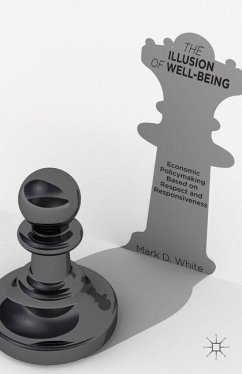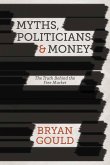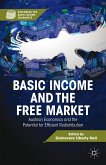The use of measures of economic output to guide policymaking has been criticized for decades because of their weak ties to human well-being. Recently, many scholars and politicians have called for measures of happiness or subjective well-being to be used to guide policy in people's true interests.In The Illusion of Well-Being, Mark D. White explains why using happiness as a tool for policymaking is misguided and unethical. Happiness is too vague a term to define, and too general a concept, to measure in a way that captures people's true feelings. He extends this critique to well-being in general and concludes that no measure of well-being can do justice to people's true interests, which are complex, multifaceted, and subjective.White suggests instead that policymaking be conducted according to respect and responsiveness, promoting the true interests of citizens while addressing their real needs, and devoting government resources to where they can do the most good.
"The central arguments in Mark White's book will be familiar and attractive to those inspired by the work of Friedrich Havek and James Buchanan. ... White manages to touch on a wide range of topics that are of central importance to the ethics of economics, economics in ethics, and ethics out of economics. The book would be well suited as a textbook to supplement the classic literature for an undergraduate course on philosophy, politics, and economics." (Daniel D. Moseley, The Independent Review, Vol. 20 (4), Spring, 2016)
"Happiness may be our most prized objective. But it is elusive, hard-to-measure, and difficult to explain to others, often even to ourselves. White shows why using measures of gross domestic happiness instead of gross domestic product are doomed to fail. He persuasively concludes that governments that respect individual autonomy will do better in the aggregate than hubristic governments that use public conceptions of well-being to override private choices." - Richard A. Epstein, Laurence A. Tisch Professor of Law, New York University, USA; Peter and Kirsten Bedford Senior Fellow, The Hoover Institution, USA; James Parker Hall Distinguished Service Professor of Law Emeritus and Senior Lecturer, The University of Chicago, USA
"Adam Smith famously called out the 'man of systems' in The Theory of Moral Sentiments and warned us in The Wealth of Nations that political power would nowhere be as dangerous as in the hands of those who believe they can direct us in our decisions. Unfortunately, Smith's call for humility in the art of political economy has too often given way to exercises in hubris justified either on pure ideological grounds or on misplaced scientism ground. Mark White is one of the most articulate voices today restating the basic Smithian claim for humility in our political economy. In The Illusion of Well-Being, he tackles recent efforts by the 'men of systems' to develop happiness indicators and to use those indicators to curtail our freedom of choice and to dictate our economic lives for us. Such proposals are vague and imprecise as well as obnoxious and obtrusive. White, like Smith, calls for an economics and political economy which affords dignity and respect to the individuals. White's argument is an articulate case for an economic policymaking that is consistent with democratic ways of relating to one another as citizens, and for a political order of learning liberalism." - Peter Boettke, University Professor of Economics & Philosophy, George Mason University, USA
"White addresses our increasing faith in quantification . . . The more relentlessly you measure people's behavior, the greater the temptation to steer that behavior in subtle and sometimes not-so-subtle ways . . . A quantified state optimizes outcomes by narrowing possibilities - and establishing 'efficiency and uplift for all' as the new national mandate. You don't need a sophisticated sensor network to register that as a step backward." - Greg Beato, Reason, on The Illusion of Well-Being and The Manipulation of Choice
"Happiness may be our most prized objective. But it is elusive, hard-to-measure, and difficult to explain to others, often even to ourselves. White shows why using measures of gross domestic happiness instead of gross domestic product are doomed to fail. He persuasively concludes that governments that respect individual autonomy will do better in the aggregate than hubristic governments that use public conceptions of well-being to override private choices." - Richard A. Epstein, Laurence A. Tisch Professor of Law, New York University, USA; Peter and Kirsten Bedford Senior Fellow, The Hoover Institution, USA; James Parker Hall Distinguished Service Professor of Law Emeritus and Senior Lecturer, The University of Chicago, USA
"Adam Smith famously called out the 'man of systems' in The Theory of Moral Sentiments and warned us in The Wealth of Nations that political power would nowhere be as dangerous as in the hands of those who believe they can direct us in our decisions. Unfortunately, Smith's call for humility in the art of political economy has too often given way to exercises in hubris justified either on pure ideological grounds or on misplaced scientism ground. Mark White is one of the most articulate voices today restating the basic Smithian claim for humility in our political economy. In The Illusion of Well-Being, he tackles recent efforts by the 'men of systems' to develop happiness indicators and to use those indicators to curtail our freedom of choice and to dictate our economic lives for us. Such proposals are vague and imprecise as well as obnoxious and obtrusive. White, like Smith, calls for an economics and political economy which affords dignity and respect to the individuals. White's argument is an articulate case for an economic policymaking that is consistent with democratic ways of relating to one another as citizens, and for a political order of learning liberalism." - Peter Boettke, University Professor of Economics & Philosophy, George Mason University, USA
"White addresses our increasing faith in quantification . . . The more relentlessly you measure people's behavior, the greater the temptation to steer that behavior in subtle and sometimes not-so-subtle ways . . . A quantified state optimizes outcomes by narrowing possibilities - and establishing 'efficiency and uplift for all' as the new national mandate. You don't need a sophisticated sensor network to register that as a step backward." - Greg Beato, Reason, on The Illusion of Well-Being and The Manipulation of Choice








